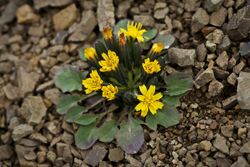Biology:Askellia pygmaea
| Askellia pygmaea | |
|---|---|

| |
| Scientific classification | |
| Kingdom: | Plantae |
| Clade: | Tracheophytes |
| Clade: | Angiosperms |
| Clade: | Eudicots |
| Clade: | Asterids |
| Order: | Asterales |
| Family: | Asteraceae |
| Genus: | Askellia |
| Species: | A. pygmaea
|
| Binomial name | |
| Askellia pygmaea (Ledeb.)Sennikov
| |
| Synonyms[1] | |
| |
Askellia pygmaea, the dwarf alpine hawksbeard,[2] is a species of Asian and North American plants in the tribe Cichorieae within the family Asteraceae.
Distribution
It is native to western, northern, and eastern Canada (Yukon, Northwest Territories, British Columbia, Alberta, Nunavut, Quebec, Labrador, Newfoundland), the western United States (Alaska, Montana, Wyoming, Colorado, Idaho, Utah, Nevada, Washington (state) , Oregon, California ), Russia , Mongolia, Kazakhstan, and western China (Tibet + Xinjiang).[3][4]
Description
Askellia pygmaea is a perennial up to 20 cm (8 inches) tall, with a deep taproot and spreading by means of underground rhizomes thus forming dense clumps. Stems are sometimes erect, but sometimes trailing along the ground. One plant can have more than 80 small flower heads, each with 9-12 yellow ray florets but no disc florets.[5][4]
References
- ↑ The Plant List, Askellia pygmaea (Ledeb.) Sennikov
- ↑ "Crepis nana". Natural Resources Conservation Service PLANTS Database. USDA. https://plants.usda.gov/core/profile?symbol=CRNA. Retrieved 21 June 2015.
- ↑ Biota of North America Program, 2014 state-level distribution map
- ↑ 4.0 4.1 Flora of China, 矮小假苦菜 ai xiao jia ku cai Askellia pygmaea (Ledebour) Sennikov, Komarovia. 5: 86. 2008.
- ↑ Flora of North America, Dwarf alpine hawksbeard, Crepis nana Richardson
Wikidata ☰ Q5184281 entry
 |

